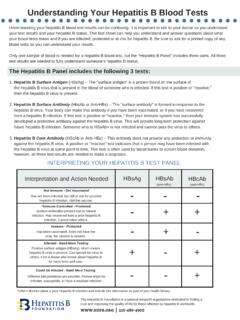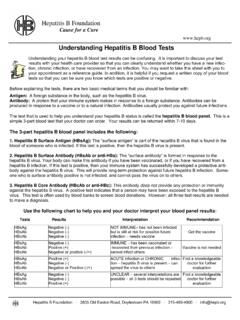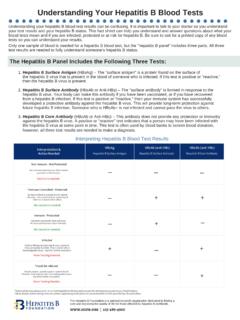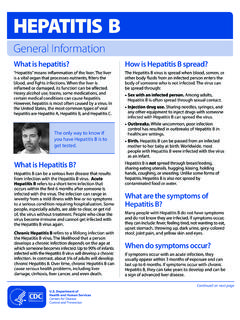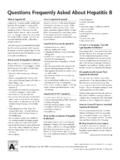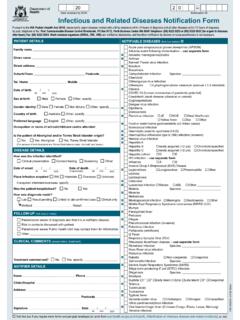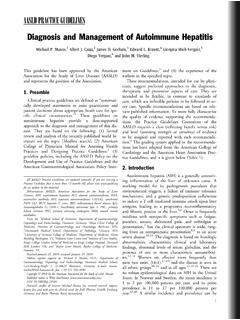Transcription of Interpretation and Action Needed HBsAg HBsAb HBcAb
1 Understanding Your hepatitis B Blood TestsUnderstanding your hepatitis B blood test results can be confusing. It is important to talk to your doctor so you understand your test results and your hepatitis B status. This fact sheet can help you understand and answer questions about what your blood tests mean and if you are infected, protected or at risk for hepatitis B. Be sure to ask for a printed copy of any blood tests so you can understand your results. Only one sample of blood is Needed for a hepatitis B blood test, but the " hepatitis B Panel" includes three parts. All three test results are Needed to fully understand someone's hepatitis B | 215-489-4900 The hepatitis B Panel includes the following 3 tests:1.
2 hepatitis B Surface Antigen ( HBsAg ) The "surface antigen" is a protein found on the surface of the hepatitis B virus that is present in the blood of someone who is infected. If this test is positive or "reactive," then the hepatitis B virus is present. 2. hepatitis B Surface Antibody ( HBsAb or Anti-HBs) The "surface antibody" is formed in response to the hepatitis B virus. Your body can make this antibody if you have been vaccinated, or if you have recovered from a hepatitis B infection. If this test is positive or "reactive," then your immune system has successfully developed a protective antibody against the hepatitis B virus.
3 This will provide long-term protection against future hepatitis B infection. Someone who is HBsAb + is not infected and cannot pass the virus to others. 3. hepatitis B Core Antibody ( HBcAb or Anti-HBc) This antibody does not provide any protection or immunity against the hepatitis B virus. A positive or "reactive" test indicates that a person may have been infected with the hepatitis B virus at some point in time. This test is often used by blood banks to screen blood donation, however, all three test results are Needed to make a diagnosis.+++++--------HBsAgHBsAbHBcAbIn terpretation and Action Needed (anti-HBc)(anti-HBs)Not Immune - Get VaccinatedImmune - ProtectedImmune - ProtectedInfected - Need More TestingCould be Infected - Need More TestingHas not been infected, but still at risk for possible hepatitis B infection.
4 Get the antibodies present due to natural infection. Has recovered from a prior hepatitis B infection. Cannot infect been vaccinated. Does not have the virus. No vaccine is Needed . Positive surface antigen ( HBsAg ), which means hepatitis B virus is present. Can spread the virus to others. Find a doctor who knows about hepatitis B for more tests and interpretations are possible. Person might be infected, susceptible, or have a resolved infection.+INTERPRETING YOUR hepatitis B TEST PANELThe hepatitis B Foundation is a national nonprofit organization dedicated to finding a cure and improving the quality of life for those affected by hepatitis B worldwide.
5 Additional hepatitis B Blood Tests: hepatitis B can be a complicated liver infection to understand, so additional blood tests may be ordered so your doctor has a better understanding of what kind of care and follow-up is Needed . If you have a chronic infection, your doctor will monitor your hepatitis B infection and the health of your liver by ordering these tests every 3 to 6 months, or at least annually. These tests can also help your doctor determine if you need treatment. It is important to be seen by a health care provider who understands hepatitis B so you get the right diagnosis, care and IgM or Anti-HBc IgG hepatitis B e-Antigen (HBeAg) This is a viral protein made by the hepatitis B virus that is released from infected liver cells into the blood.
6 This test detects how much virus is in the blood as a result of very active viral replication. A negative test result indicates the virus may not be actively reproducing in the liver. In general, a person is considered very infectious when the test is positive, and less infectious when the test is negative. The loss of e-Antigen can occur naturally or as a result of drug treatment. Sometimes a negative test result can indicate a mutant hepatitis B virus is present. So, the absence of e-Antigen does not always mean there is little or no active viral replication. The doctor can confirm with additional tests.
7 hepatitis B e-Antibody (HBeAb or Anti-HBe) This is not a protective antibody and is made in response to thehepatitis B e-Antigen. Once the virus stops actively replicating in the liver, the e-antigen protein can disappear and then the e-Antibody appears (making this a positive test result or HBeAb+). This can happen spontaneously or after treatment and while the clinical significance of this result is not fully understood, it is generally considered good. hepatitis B Virus DNA This test measures the amount of hepatitis B DNA in the blood, which tells how actively the virus is replicating.
8 It is a more expensive test that may not be available in some countries. It should be considered in conjunction with other information such as e-Antigen status, liver enzymes and possibly imaging studies. The viral load is usually measured in international units per milliliter (IU/mL), but may also be measured in copies per milliliter (cp/ml). There are typically 5 copies in 1 international unit. HBsAg Quantification (Quantitative hepatitis B Surface Antigen/qHBsAg) This blood test measures the amount of hepatitis B surface antigen in the blood. When used in combination with the HBV DNA test, qHBsAg can provide a liver specialist with additional insights to an individual s HBV infection.
9 It can also be used in predicting and monitoring treatment response. A positive/reactive anti-HBc IgM test result usually indicates a new acute positive/reactive anti-HBc IgG test usually indicates a chronic Tests:Liver Function Tests and Liver Enzymes These blood tests measure potential liver damage (or liver inflammation) caused by the hepatitis B virus. When the liver is injured, the liver enzymes can leak into the bloodstream. The larger the number, the greater the potential liver Aminotransferase (ALT or SGPT) This enzyme is monitored closely with a hepatitis B infection and is found almost exclusively in the liver.
10 This test is useful in deciding whether a person would benefit from treatment or for evaluating how well a person is responding to therapy. The upper limits of normal ALT for men is 30 units/liter and for women is 19 units/liter. ALT may be elevated for reasons other than hepatitis B infection. Alpha-Feto Protein (AFP) This blood test is used to screen for the development of primary liver cancer in those living with chronic hepatitis B and should be tested at every visit. Non-pregnant adults should not have elevated AFP. If an individual does have elevated AFP, then more tests and imaging studies should be ordered.


